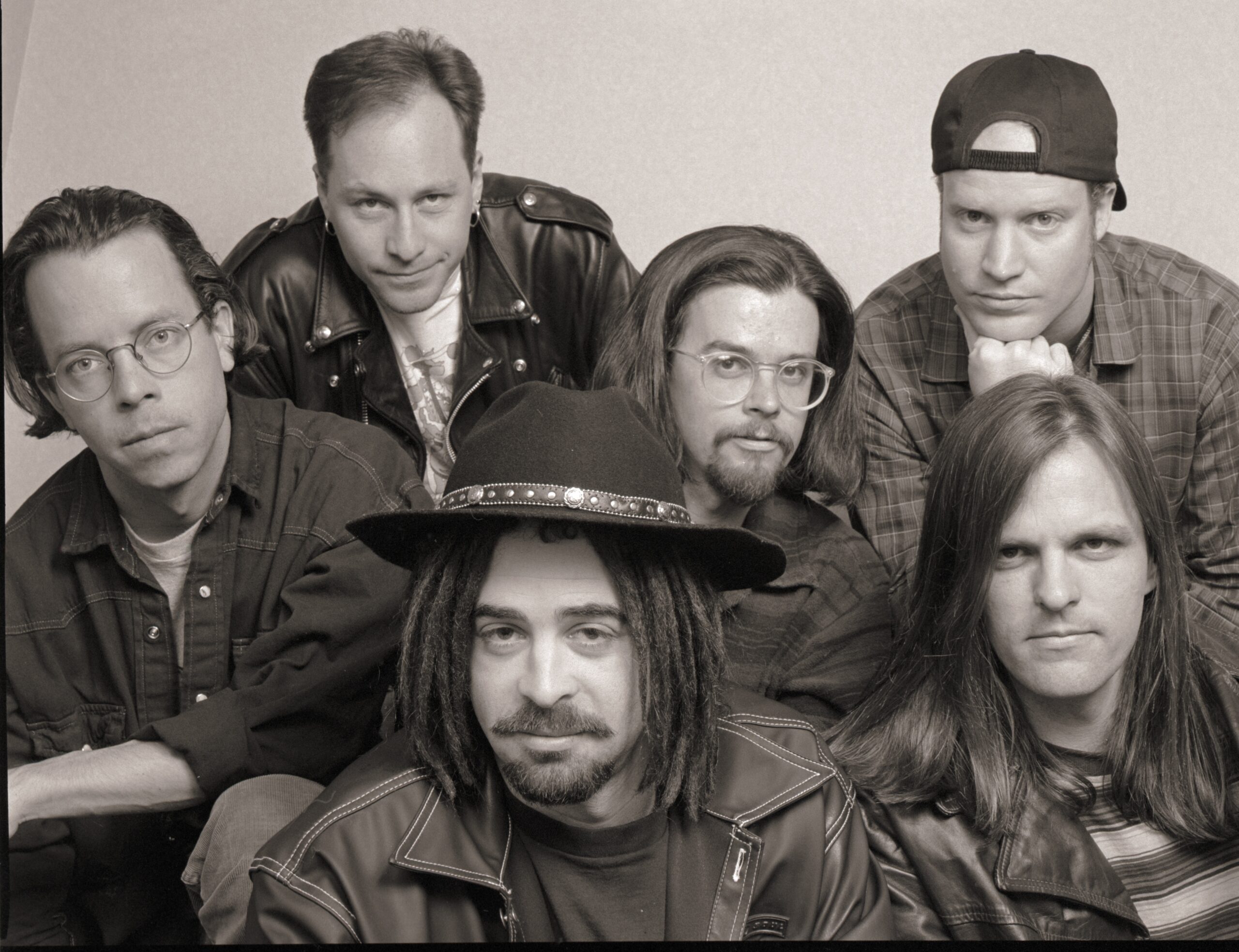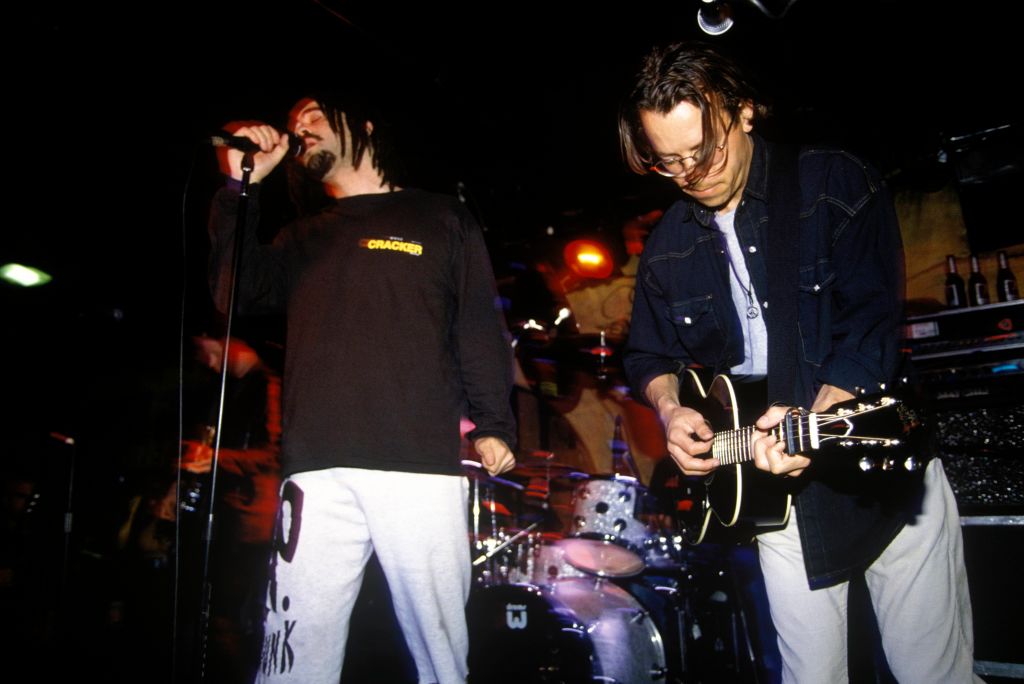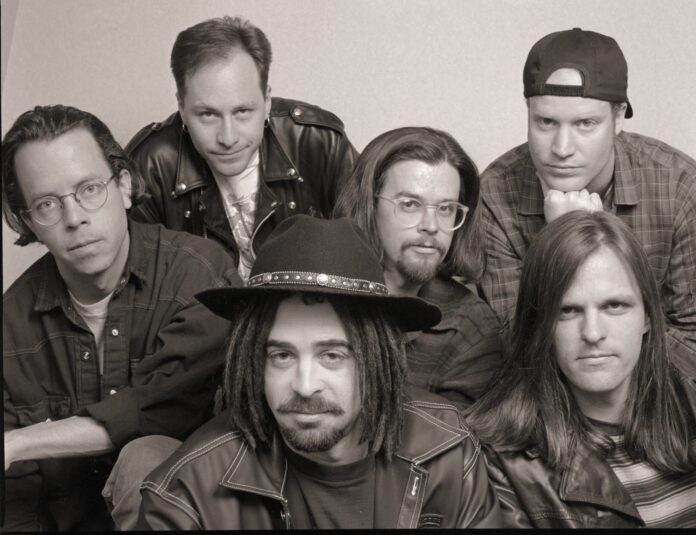
This article originally appeared in the May 1994 issue of SPIN.
“I was kind of hesitant about doing this interview,” announces Counting Crows‘ dreadlocked frontman Adam Duritz, “because I didn’t think anyone at SPIN liked us. I don’t realty care about that particularly, but I didn’t want to participate in my own execution.”
More from Spin:
- Aerosmith Retiring From Touring Due To Steven Tyler Vocal Cord Injury
- Universal Lands Film Adaptation Of Britney Spears Memoir
- Blood’s ‘Loving You Backwards’ Is Confounding and Often Thrilling
Duritz’s Charlottesville, Virginia, hotel room resembles that of a rookie traveling salesman. “My life is so much more complicated since I became a rock star,” he jokes, gesturing at the mess sprawling from his suitcase. I assure him I’m not here to do a hatchet job, but he’s close to the mark about no one at SPIN liking his band. Not that the Counting Crows need our endorsement: Their debut album, August and Everything After, has rocketed up the charts, moving from the bottom half of the Billboard Top 200 to the Top Ten in a matter of weeks, fueled by an appearance on Saturday Night Live and heavy MTV airplay of their video for “Mr. Jones.” As VJ Lewis Largent asked recently by way of introduction to the clip, “Could this Counting Crows album be any huger?”
So what’s not to like? Surely not the Crows’ well-crafted, tasteful, solid, earthy, Ikea rock. Surely not the band members themselves, all of whom have toiled in obscurity for years in the Bay Area music scene, beating their heads against all the familiar struggling-musician walls (apathy, poverty, jealousy) before corning together less than two years ago to form Counting Crows. Since then, things have more or less taken off — signed to DGC within six months, after a heated bidding war, for an advance so large local wags were dubbing the combo “Accounting Crows.” Rave reviews, constant touring, including stints with the Cranberries, Suede, and currently. Cracker. And now, the specter of imminent full-fledged pop stardom.
What’s bothersome about the Crows is that the band’s sudden success seems to imply a kind of musical conservatism on the part of the listening public that we’d rather not have to acknowledge. Even fans of the Crows point to the band’s strong traditionalism, and it really depends on which side of the old-fogey fence you sit whether this stuff attracts or repels you. This division was apparent well before the band had risen to its present empyrean heights; back in the Crows’ Bay Area stomping grounds, San Francisco Weekly critic Eric Weisbard reviewed the band’s debut album as “a sound only aging rock critics could find novelty in,” but, as Weisbard is the first to admit, apparently he was wrong. Dirk Richardson of the Bay Guardian, with whom Weisbard had a testy exchange in print around the same time, describes the band as “an updated version of classic rock. For me, I’m 44, and I don’t mind it at all. There are things they have in common with bands like R.E.M. and U2, but they also have a real solid foundation, obviously, in Van Morrison and the Band.”
Duritz himself approaches the comparisons with practiced aplomb; it’s obviously a question he’s getting used to answering: “I guess they’re fine with me. I certainty love those guys, and I’ve taken lessons from them and a lot of other people. You become more wary of all these misrepresentations of yourself, because they assume much larger proportions as we get bigger. It’s hard not to be nervous about them, even if they probably will all fade away. In a year and a half I don’t think I’ll have to deal with the Van Morrison thing anymore. All I can say is, it just seems like me to me.”

“Here’s how huge I am,” says Counting Crows drummer Steve Bowman, sitting with his bandmates in their tour manager’s hotel room. ”Dave the guitarist and I are sitting in one of our two vans, and a girl walked up. She stuck her head in and looked at us and said, ‘Are you guys the crew?’ And Dave said, ‘Yeah,’ and she said, ‘Well, you guys count, too.’ We’re her favorite band, and she doesn’t even know what we look like.” Bowman’s anecdote underscores the journeyman aspect of his comrades, who despite their current prominence still travel by van, still open every night for Cracker, and still (with the exception of the mop-headed Duritz) can’t get recognized by their own fans.
The band members (besides Bowman and Duritz, there’s Matt Malley, bass, Charlie Gillingham, keyboards, David Bryson, guitar, and Dan Vickrey, guitar) range in age from 27 to 32, and are mostly Bay Area natives with long résumés in the music scene there. After years of more or less disappointment, they find themselves reborn as successful working musicians, a title that eludes most of their friends back home and has them feeling pretty damn juiced, although in a mature sort of way.
“Being older makes you a lot more nonchalant about success,” says Gillingham ”Because we’ve all had friends who had good record deals and then got dropped, or been in great bands and been dropped or it didn’t work out, or people who were brilliant, brilliant, brilliant, but just couldn’t seem to sell records at all. So after a while hanging around the same city and being in the same scene — success doesn’t seem so sweet. Being a pop star is not that important.”
Whatever your sentiments concerning the Crows’ music, there is no questioning the wellsprings of sincerity and integrity from which it flows. Baltimore-born Duritz, the son of a doctor, spent most of his young life moving around (Boston, El Paso, Denver, Houston) before settling in the Berkeley area. “I don’t have any real roots,” he says. “The most settled I’ve ever been is with this band.” He began writing songs in his freshman year at the University of California. Looking back, Duritz says, “I can see why [our current success] happened now instead of when I was 21. I could see where there was potential, but I would have had to have made five albums that sucked.” Counting Crows’ ascent is no triumph of marketing — in fact, Duritz deliberately tried to put the brakes on the star-making machinery. “I’ve tried everything to keep it a slow thing,” he insists. “We didn’t release a single, we just went out and toured, and kept the record company off of it. I just thought that was the best way to do it.”
Kind of like the R.E.M. theory of development?
“Exactly. I was basing this whole thing on what it was like to grow up as an R.E.M. fan. At this point today R.E.M. can do whatever they want, because they have such a core of people who are into them for being R.E.M. and their records. Not for a hit. This is what I was trying to do with this band, just to, like, set it up with the touring now, not alienate a lot of people by becoming some big pop phenomenon. I haven’t done anything that I regret.”
Later that night at the local rock club, a capacity crowd of clean-cut, low-key collegians sways and claps politely to the Counting Crows set. Maybe it’s just the cold medicine, but I find myself zoning out halfway through the performance; the band saws away with well-honed chops and obvious zeal, and Duritz is a riveting singer whose somewhat studied mannerisms belie a deep commitment to his wordy, conversational lyrics (“I think my songs are accumulations of details; things people actually would say — that I would actually say,” says Duritz). It’s just not translating, not to me, anyway. I perk up along with the crowd when ”Mr. Jones” starts up; not only is it the most familiar song, but it may be the closest thing to a “rock” song in the band’s gentle, somber repertoire.
Live, Duritz plays with the tunes and lyrics of many of his songs, but none so drastically as “Mr. Jones,” whose melody is nearly unrecognizable tonight and many of whose lyrics have been radically altered. It’s as if Duritz wants to distance himself both from the phenomenon of a “hit” record, and from the sentiment of the song itself, which originally concerned the (patently foolish) longings of a frustrated musician.
“‘Mr. Jones’ really has undergone a change in tone,” Duritz explains later. “It’s become more about someone who’s ironically looking back on his dreams than it is about someone just having the dreams. See, the time schedule’s changed for me, too. As of today we’re No. 10 [on the Billboard album chart]. So the line, ‘We all want to be big big stars but we got different reasons for that,’ is now ‘We all want to be big big stars but we had no idea what it means to do that.’ I’m also singing, ‘When everybody loves me, I’m just about as fucked-up as I can be.’ And ‘Every time I turn on the TV, I gotta see myself staring right back at me.’”
I noticed, too, that instead of the line, “I want to be Bob Dylan,” Duritz sang, “I want to be Alex Chilton,” which changes the focus from wanting to be a big star to wanting to be Big Star.
“A lot of the changes were semi-unconscious, it just started happening over the course of the last month,” continues Duritz. “One day I realized, ‘Why am I singing about Bob Dylan? I don’t want to be Bob Dylan at all. I meant it to be humorous at the time — you have to understand when I wrote that song, I didn’t even have a band. There was no Counting Crows. It just wasn’t happening. I was never going to be Bob Dylan. Now I don’t know who I’m going to be.”
To see our running list of the top 100 greatest rock stars of all time, click here.












